Israel Surrounded Growing Threats in the Middle East
August 1, 2010
by: Joshua Spurlock, BFP Israel Mosaic Radio
And now, Israel is faced with a former ally, Turkey, that’s becoming more and more antagonistic as they grow closer and closer to the Iranian circle. Being surrounded by enemies is nothing new for Israel, but the threats now are nonetheless very different. With the increase in missile capabilities for Hizbullah, Hamas, Syria, and Iran, all of Israel is well within firing range. And if her enemies can’t destroy her with weapons, they can seek to prevent the Jewish state from fighting back with lawsuits and legal attacks in international courts and at the United Nations. Even their presumed peace partner, the Palestinian Authority, is pushing a boycott against Israeli settlement goods and fighting for Israel’s isolation in the international community.
The change in Turkey has been the most dramatic turn against Israel this year. As a NATO member and long-time Israeli ally, it has even had military contracts with Israel in the past. Now, Turkey’s about-face has added an unexpected name to the Iranian axis. And if their Iranian leanings were in doubt before, Turkey’s outrage against Israel after the flotilla incident and opposition to United Nations’ sanctions against Iran has signaled the shift towards Iran is very real. While that may be more a result of the leadership of Prime Minister Recep Tayyip Erdogan than a shift for the entire country, the potential of another powerful Middle East nation fully aligning itself with Iran is very bad news for Israel.
The current times are certainly grave and serious ones for Israel, times where friends and supporters are needed while enemies grow in number. Thankfully, Israel has the best military in the Middle East, one of the most stable economies in the world, and a relatively solid support group at home and abroad fighting on her behalf. Nonetheless, the dangers are intensifying around this tiny nation of 7.5 million—compared to 374 million Muslims living in the surrounding 23 Islamic states with a total land mass over 640 times her size. On the following two pages, we take a look at six of the nations and groups threatening Israel the most, including a ranking of what we believe to be the opponents’ threat levels against the Jewish state.
Islamic States
Iran
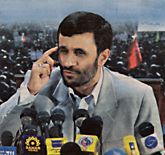 President Mahmoud Ahmadinejad
President Mahmoud Ahmadinejad
Threat Level: 10
Government: Theocracy with dictatorship-leanings
Dominant religion: Shia Islam
“If the Zionist regime attacks Iran, the Zionists will have no longer than a week to live.”—Chief of Staff Esfandiar Rahim Mashaei
- Believed to be pursuing nuclear weapons. Enriching uranium to higher levels, claiming it’s for medical research. Possesses enough nuclear fuel to build two nuclear bombs if enriched to weapon’s grade. (The New York Times)
- Has repeatedly threatened the state of Israel with annihilation.
- Largest deployed ballistic missile force in the Middle East, possessing approximately 1,000 missiles that range from 90–1,200 miles or 145–1,931 kilometers. (Foxnews) Note: Israel is only 600 miles (or 1,000 kilometers) from Iran and is only 260 miles or 418 kilometers long, so a missile from Iran could even hit Eilat in the far South.
- Could be able to fire intercontinental ballistic missiles capable of reaching the US by 2015. (Foxnews)
- Leads a growing, global anti-Israel, anti-West bloc of nations and terror groups. Has allies of convenience with Russia and China, which, while not always supporting Iran tend to be roadblocks to international opposition against Tehran.
Syria
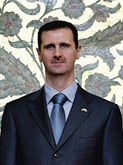 President Bashar al-Assad
President Bashar al-Assad
Threat Level: 7
Government: Dictatorship
Dominant religion: Sunni Islam
“Israel will greatly suffer by a Syrian response should it attack. It understands this well… No one wants war, however, Syria will fight to its last soldier in case a war is forced upon it.”
- Prime Minister Muhammad Naji al-Otari
- Believed to have attempted to develop nuclear capabilities that were reportedly destroyed by Israel. Interested in civilian nuclear cooperation with Russia. Not fully cooperating with an International Atomic Energy Agency (IAEA) investigation of a potential nuclear site. (IAEA)
- In the last year, increased estimated rocket capabilities able to reach the Tel Aviv area by 1,000 rockets. Now estimated to possess 2,300 such rockets. (The Jerusalem Post)
- Continues smuggling of arms to Hizbullah in defiance of the UN.
- Has seen somewhat improving relations over the past couple of years with the US despite continued alliance with Iran.
- Growing relationship with Turkey. The first ever visit by a Russian president to Syria occurred in May. (Ynet, The Media Line)
Turkey
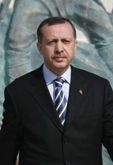 Prime Minister Recep Tayyip Erdogan
Prime Minister Recep Tayyip Erdogan
Threat Level: 3
Government: Technical democracy
Dominant religion: Sunni Islam (growing religiosity but traditionally more secular)
“Israel must pay the price for what happened.”
- Recep Tayyip Erdogan, calling for an international investigation into the flotilla incident
- Newest growing threat against Israel. Increased incitement against Israel through television, government statements.
- Turkish Humanitarian Relief Foundation (IHH) believed to be behind Gaza flotilla violence. Turkish government may have been involved. (Haaretz)
- Has led calls for international investigation of Israel for flotilla incident. Intends to reduce cooperation with Israel in multiple fields (Ynet, The Media Line).
- Growing relationship with Iran, Syria, including military drills with Damascus. (Ynet) Along with Brazil, one of only two nations to vote against June’s UN sanctions on Iran. (The New York Times)
- Should threats against Israel shift from diplomatic and economic to significant violence, Turkey would be the second-most serious threat to Israel in the Middle East.
Islamic Entities
Hizbullah (in Lebanon)
 Secretary General Sheik Hassan Nasrallah
Secretary General Sheik Hassan Nasrallah
Threat Level: 8
Government: Member of Lebanon’s coalition democracy
Dominant religion: Shia Islam
“Israel used to wage wars knowing that its home front was safe. This has ended in the wake of the 2006 war. We have our home front, and they have theirs. They bomb us, we bomb them. They kill us, we kill them. This is their strategic weakness today.”
- Secretary General Sayyed Hasan Nasrallah
- Has received four times the amount of weapons they had in 2006 (The Media Line)
- Believed to have Scud missile capabilities in Syria (Ynet, citing Channel 2).
- Possesses tens of thousands of rockets, including M-600 missiles capable of reaching Tel Aviv and hitting targets with increased accuracy. (The Jerusalem Post)
- International terror capabilities in at least the Middle East and South America. Believed to be behind last year’s terror threats in Egypt and the terror attack against a Jewish community center in South America in 1994. (The Media Line, BBC)
- While not technically a controlling partner in Lebanon’s government, Hizbullah has had growing support from Lebanon’s majority governing coalition, which in the past opposed Hizbullah.
- Significant weapons upgrades and smuggling continues despite UN resolution prohibiting re-arming of Hizbullah.
- Past interest in the UK to recognize Hizbullah’s “political wing.” (The Wall Street Journal)
Hamas (in Gaza)
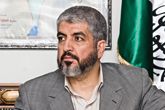 Politburo Chief Khaled Mashaal
Politburo Chief Khaled Mashaal
Threat Level: 5
Government: Dictatorship with democratic trappings
Dominant religion: Sunni Islam
“Daddy gave me a present, a machine gun and a rifle. When I am a big boy, I will join the Liberation Army, the army of Al-Qassam [Hamas], which has taught us how to defend our homeland. Our homeland is precious, precious. We [are] victorious, victorious over America and Israel.”
- Segments of a song sung by boy on a Hamas children’s TV program (Palestinian Media Watch)
- Hamas and Islamic Jihad have 5,000 rockets with a range up to 40 km/24 mi, said intelligence chief Yuval Diskin. (Ynet)
- Current face of Palestinian movement for Islamic world due to Gaza blockade–flotilla incident.
- Improving relationships with Turkey, elements in the West. Met with Russian President Dmitry Medvedev in Syria last May.
- Has agents and connections capable and interested in traveling in the Middle East and beyond.
- Terrorists in Gaza, possibly connected to or sanctioned by Hamas, interested in sea-based terror attacks. (Ynet)
- Israeli deterrence vis-a-vis Hamas improved dramatically following Operation Cast Lead in January 2009. However, occasional violence spikes still come from Gaza.
- Seems to be somewhat split in its leadership. Some in Hamas seem more open to compromise on issues such as reconciling with Fatah and a prisoner swap for kidnapped Israeli soldier Gilad Shalit, while Damascus leader Khaled Meshal is more hard-line. (Haaretz)
Palestinian Authority (in West Bank)
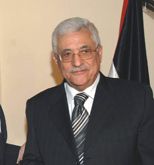 President Mahmoud Abbas
President Mahmoud Abbas
Threat Level: 3
Government: Technical democracy with dictatorship-leanings, led by Fatah
Dominant religion: Sunni Islam (but traditionally more secular)
“I want to defend, I want to fight, I want to carry a machine gun and a rifle…I won’t care about you [my enemy], or about the West. And we shall strike Israel.”
- Segments of a song sung by a Palestinian terrorist’s nieces and broadcast on PA TV (Palestinian Media Watch)
- Continues efforts to delegitimize Israel in the international arena. Worked to prevent Israel from joining the Organization for Economic Cooperation and Development (OECD), pushed for UN support of the Goldstone Report that accused Israel of war crimes in Gaza.
- Government-enforced boycott of Israeli settlement goods, including fines and jail times for offenders. Involved in burning of Israeli settlement goods. (Ynet)
- Increased involvement in “popular resistance” such as protests, rioting.
- Continues incitement against Israel through TV and naming of events for terrorists, despite claims to the US that they don’t engage in incitement. (Palestinian Media Watch)
- While security situation vis-a-vis Israel has improved significantly, occasional violence occurs.
- Growing international impatience over the Palestinian–Israel peace process, combined with Palestinian intransigence, has led to rumors of potential imposed solutions by US or UN. Possibility exists that Palestinians may seek UN approval for unilateral statehood in 2011.


 President Mahmoud Ahmadinejad
President Mahmoud Ahmadinejad  President Bashar al-Assad
President Bashar al-Assad  Prime Minister Recep Tayyip Erdogan
Prime Minister Recep Tayyip Erdogan  Secretary General Sheik Hassan Nasrallah
Secretary General Sheik Hassan Nasrallah  Politburo Chief Khaled Mashaal
Politburo Chief Khaled Mashaal  President Mahmoud Abbas
President Mahmoud Abbas